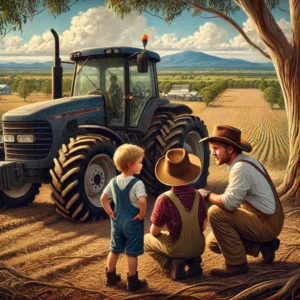Do you worry about how your farm continues after you hang up your boots? Farming is more than a business. It is a way of life, a heritage handed down through generations. At Legal Consolidated, we provide legal documents to ensure that your life’s work flourishes and that your children and their children reap the fruits of your labour.
Why is Farming Succession Planning Important?
Succession planning secures a smooth transition with minimal disruption, considering both stamp duty and Capital Gains Tax. Carefully early planning reduces conflict and ensures tax efficiency. You worked hard, and your farm requires careful handling to continue providing for the family and unborn grandchildren.
This article helps you and your advisers structure your family farm for succession and tax benefits, protect your intergenerational legacy, and inspire children to continue farming traditions.
Professor Brett Davies’s doctorate was on succession planning.
1. Farming Family Trusts – for just you and your wife

You explain to your children how to run the farm from a young age.
Similarly, take them and your wife when you visit your accountant, financial planner, and lawyer.
Consider a Family Trust with a company as the trustee. This setup allows you to separate the farm’s control from the benefits of ownership. You manage the farm today, yet your family enjoys the profits securely. When the time comes, passing the baton is seamless and tax-effective.
However, a Family Trust can only exist (except for South Australia) for 80 years. Therefore, an alternative is a 3-Generation Testamentary Trust Will. It is carefully designed to transfer the farm to the children without CGT and stamp duty. It contains Divorce Protection Trusts and Bankruptcy Trusts. It also contains Considered Person Clauses to make it hard for your children’s spouses to challenge your Will.
2. Consider Unit Trusts if two or more families run the farm
What if you have more than one child interested in the farm? A Unit Trust with a corporate trustee could be your answer. This arrangement permits each child to own a part of the farm without disputes over control or benefits. Each child holds units similar to shares, which dictate the extent of their ownership and profit entitlement. This is a free training video on Unit Trusts.
3. Australian Farming Partnership structures
Traditionally:
- Family land is purchased in Family Trusts and Unit Trusts. This is with a corporate trustee.
- In contrast, the day-to-day farming operations are carried out through a (trading) partnership, e.g., Mum, Dad, and the children who remain on the farm.
Example of a farming partnership
The four farming blocks have been purchased over the last 55 years. This is the name of four separate Family Trusts. Each has its own corporate trustee – for asset protection. Or the farming lands are purchased in a Unit Trust (with a special type of Unit Trust corporate trustee) if the children become part owners of the farm earlier than their parent’s death. (We do not recommend that. The children get it soon enough when you are dead. No point rushing it.)
Everyone working on the farm and their spouses are made partners. Or they each form a Family Trust. And their Family Trust becomes one of the partners.
The Partnership leases the property from the Family Trusts via a Lease Agreement. The Lease fee is often just a peppercorn rent, for example, $10,000 per year.
When one of the farmers dies, the old Partnership dissolves. You just build a new Partnership Deed. Whoever is left, plus the grandchildren interested in joining, sign the new Partnership Agreement.
In other words, when people exit partnerships by death or retirement or enter partnerships by adding new partners such as wives and children, the old partnership dissolves, creating a new partnership.
Farming trusts generally own few assets
Apart from a header and a few trucks, the partnership generally has no valuable assets. Therefore, there is no CGT and very little stamp duty on hopping from one Partnership to the next over the following 200 – 300 years.
You do not put into the farming trading partnership:
- off-farm assets (e.g. homes in the city)
- the farming land itself
Which primary producers use partnerships?
This is the common way your accountant and adviser set up your structure. This is no matter what primary production you engage in:
- Broadacre cropping
- Intensive livestock farming
- Dairy
- Fishing
- Viticulture
- Horticulture
- Aquaculture
4. Company v partnership – which is best to run the farm?
Rather than a partnership, why not trade via a company?
However, companies have poor structures in which to conduct farming business. They are not eligible for a range of primary production concessions:
- cannot use Financial Risk Management strategies – FMD’s
- are ineligible for primary production averaging
Plus, farming companies suffer income tax issues:
- You cannot stream income
- For you cannot stream CGT to one person, imputation credits to another, and income tax to a third person
- companies pay tax at a rate of up to 30 cents on the dollar
- If the company is of a size where it is a base rate entity, the company tax rate is 25%. This applies to most family-run businesses: https://www.ato.gov.au/rates/
changes-to-company-tax-rates/
- do not easily get Capital Gains Tax relief
- loans restrictions to shareholders and their associates
- the Company, as the owner of the farming land, cannot lease the land for a peppercorn rent – the rent has to be commercial under Division 7A
But companies are useful as trustees of your Family Trust and Unit Trust. As a mere corporate trustee, the company does not trade in its own right. It trades on behalf of the trust structure and trust beneficiaries.
5. Self Managed Superannuation Fund owning the farmland
Like most small businesses, farmers prefer to manage their finances and often dislike entrusting their superannuation to others. Consequently, their superannuation savings are typically lower.
To address this, the government allows Self-Managed Superannuation Funds (SMSFs) to own commercial properties, such as farmland. Farmers can lease the farm from their SMSF. This is provided the rent is at market rates, not minimal ‘peppercorn’ rates.
Superannuation only pays a 15% tax; the capital gains tax if you hold the farmland for more than one year is usually only 10%.
Intergenerational Legacy and Tax Benefits
Succession planning is not just about changing hands; it is about preserving wealth across generations. Structuring correctly minimises tax liabilities. It ensures that your farm remains viable and competitive, even as it passes through the hands of your descendants.
The manual outlines the de facto death taxes the farmer’s children must navigate:
- 3-Generation Testamentary Trusts – reduces CGT, income tax & stamp duty for up to 80 years from the date of death
- Superannuation Testamentary Trust – stops the 17% or 32% tax on Super going to adult children
- Bankruptcy Trusts – if a beneficiary is bankrupt
- Divorce Protection Trust – if a child separates from their partner
- Maintenance Trust – if the beneficiary is under 18 or vulnerable
 Inspiring the Next Generation
Inspiring the Next Generation
A farm is more than land and crops; it’s a legacy. By structuring for succession, you do more than protect assets—you inspire your children. You instil in them the values of stewardship and hard work. With proper planning, they see a future in farming and are motivated to uphold and enrich the family tradition.
At Legal Consolidated, we provide legal documents online with an educational journey. Our documents, such as Partnership Agreements, are tailored to the unique needs of farmers. See how we outline the specifics for farmers like you at Partnership Agreement for Farmers.
You do not want the children to lose heart with a fuzzy promise to give them the farm at your death. However, you cannot transfer the farm too early because of death duties and the continual threat of your children divorcing or going bankrupt. It is a difficult balance.
Common tax-effective Business Structures for farmers
A prevalent structure among farmers is to hold land within Family Trusts, assigning one piece of land per trust with a Corporate Trustee. This setup offers robust asset protection and potential exemptions from stamp duty, penalty stamp duty, and land tax—benefits that can vary with government policy changes.
As agricultural technology advances and Combine Harvesters grow larger, fewer farmers reside in rural towns, decreasing our representation in state governments. Farmers must prepare for potential challenges, as changing policies could impact their operations.
Get your farming children involved with business structures from birth

If the world’s richest man takes his 3-year-old son to meetings, it’s certainly good enough for you. Educate your children in business structures, not just in farming practices.
You are a fool if you find yourself in a room where advisers suggest structures you do not understand.
You believe using the best agriculture practices, like employing slow-release fertilizers for balanced crop nutrition, is crucial. You would not outsource those issues to other people. Similarly, you should learn to understand the legal and financial frameworks protecting your farm. Knowledge empowers you, your spouse, and your children.
As experts, we only advise you. You are the business owner, not us, the so-called experts.
For example, if you are discussing your farm’s future with your accountant, lawyer, and financial planner, it’s essential that you, your spouse, and your children understand the roles of an Appointor, Backup Appointor, and Trustee in a Family Trust. Without this knowledge, you are not fully prepared for the meeting.
In 2024, the then-richest man in the world, Elon Musk, attended a meeting for the incoming US government with his 3-year-old perched on his shoulder. You should consider doing the same. One day, you will be dead, and your spouse and children must manage on their own. Prepare your children from birth and your wife from the day you get married.
What can Legal Consolidated do to help you structure and transfer the family farm at death?
Legal Consolidated Barristers and Solicitors does not give legal advice. Rather, you build legal documents on our website.
Press the START FOR FREE button to see if the document suits you. Enjoy the free hints for each question.
The building process for each of our documents educates and empowers you. It answers most questions.
Free Farming Succession Planning Toolkit – protect your intergenerational legacy
These structures safeguard your intergenerational legacy, ensuring that future generations benefit from your diligent work and vision.
This free toolkit educates you on the various structures for planning your farm’s future. Enjoy the free education:
-
-
-
- Asset protection for the farmer’s children
-
-
Farmer lending money to children
-
-
-
- Lend money to the farming spouse most at risk – do not give them money
- Farmer should lend money to their children – do not make gifts
- Every year, make sure your children forgive any money your family trust owes them
-
-
3-Generation Testamentary Trust Wills for rural landowners
-
-
-
- How the farmer can protect vulnerable children in his Will
- How to stop your daughter-in-law from challenging your Will
- How do Bankruptcy Trusts in your Will protect the farmer’s children
- Life Estates do NOT protect farming children – cause tax problems
-
-
Farming Family Trusts
-
-
-
- How to put succession planning into your Family Trust
- Son lost the farm to his sisters – Family Trust guilty
- Free training video on Family Trusts
- Why the best practice is to have a company as trustee of your farming family trust
- Should the farmer have a bucket company under his Family Trust?
- Using the farming Family Trust as a service trust
-
-
Unit Trust for farming assets
-
-
-
- Unit Trusts v Company to hold a farm
- Who should be the trustee of a farming unit trust?
-
-
Partnership Agreements for Farming Families
-
-
-
- Partnership leasing farmland from the Family Trust
- Common Partnership structures and safeguard the farmland in a trust
-
-
Self-Managed Superannuation
-
-
-
- Leasing farmland from your SMSF
-
-
 Inspiring the Next Generation
Inspiring the Next Generation